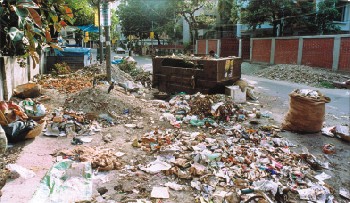 The
Green Scene
The
Green Scene
YOU
wake up in the morning, stretch, yawn, go to your window to take a
deep breath of fresh air, and what you get is a nose full of a horrid
stench from a nearby garbage heap. You decide to go out for a stroll.
The sky is clear, the birds are chirping, and you're getting into
your pace, when suddenly, the ground gives way under your feet, and
you go flying, landing with a loud thump on the ground…right next
to the discarded banana peel that literally gave you the slip. Does
this sound familiar? Are you getting fed up of this lifestyle? Maybe
it's time you should do something about it.
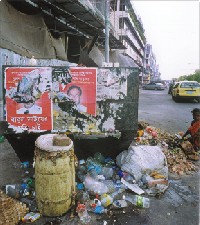 The
issue of waste management is a pressing one for most Dhakaites. Our
capital city is the 22nd largest city in terms of growing population,
and is well on its way towards becoming a mega-city. More people means
more waste, so I'm sure you get the picture…and even if you don't,
a glance at the oli-golis around the city will more than suffice.
The
issue of waste management is a pressing one for most Dhakaites. Our
capital city is the 22nd largest city in terms of growing population,
and is well on its way towards becoming a mega-city. More people means
more waste, so I'm sure you get the picture…and even if you don't,
a glance at the oli-golis around the city will more than suffice.
As
grim as this grimy situation sounds, there are some things to smile
about. Recently, people have become aware of the problem, and have
taken matters into their own hands. The Dhaka City Corporation (DCC)
is encouraging community-based organizations and local NGO's to organize
and carryout community waste management programs (mainly house to
house collection and disposal). The pilot project of Dhanmondi Solid
Waste Management is the first DCC approved Solid Waste Management
Pilot Project and Sheltech Consultants (Pvt.) Ltd. (SCPL) is the organization
that is carrying out the project. Initially the project has started
in a small chunk of Dhanmondi (Block G & H) to find out and determine
more possibility of interactions and feedback to apply effectively
in whole Dhanmondi area.
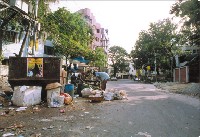 There
are similar types of initiatives in various parts of the city organized
by either community-based organizations or by the NGOs. Their efforts
however, despite being welcomed by residents of these areas, have
not so far provided a relief for the adverse impacts of inadequate
solid waste management. This is because they only provide the service
of door to door collection and then dump that waste at the dustbins
located on the main street, where from DCC has to collect the waste
for final disposal. The dustbins at the main streets are not being
maintained and supervised properly, so animals and scavengers throw
the waste out of the dustbins while searching food and recyclable
materials. On the other hand DCC is not efficiently removing the waste
from the dustbins due to financial and institutional constraints.
Therefore, the overall scenario for the solid waste management does
not change with the community-based initiatives, which are only focused
on not in my backyard (NIMBY) approach. Even, if the collection from
dustbins for the final disposal is made efficient, but still the major
part of the problem will remain unsolved. The final disposal requires
sanitary landfill or high-tech incineration and due to poor financial
viability, DCC is not in a position to spend on these facilities.
Hence, the problems related with the final disposal will remain there
even after the hectic efforts from the communities and efficient coordination
with the DCC for the primary collection of the waste. Even so, the
fact that more people are becoming actively aware of the problem of
waste disposal, and are trying to find solutions for it, is a step
in the right direction.
There
are similar types of initiatives in various parts of the city organized
by either community-based organizations or by the NGOs. Their efforts
however, despite being welcomed by residents of these areas, have
not so far provided a relief for the adverse impacts of inadequate
solid waste management. This is because they only provide the service
of door to door collection and then dump that waste at the dustbins
located on the main street, where from DCC has to collect the waste
for final disposal. The dustbins at the main streets are not being
maintained and supervised properly, so animals and scavengers throw
the waste out of the dustbins while searching food and recyclable
materials. On the other hand DCC is not efficiently removing the waste
from the dustbins due to financial and institutional constraints.
Therefore, the overall scenario for the solid waste management does
not change with the community-based initiatives, which are only focused
on not in my backyard (NIMBY) approach. Even, if the collection from
dustbins for the final disposal is made efficient, but still the major
part of the problem will remain unsolved. The final disposal requires
sanitary landfill or high-tech incineration and due to poor financial
viability, DCC is not in a position to spend on these facilities.
Hence, the problems related with the final disposal will remain there
even after the hectic efforts from the communities and efficient coordination
with the DCC for the primary collection of the waste. Even so, the
fact that more people are becoming actively aware of the problem of
waste disposal, and are trying to find solutions for it, is a step
in the right direction.
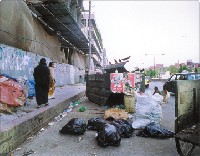 Which
brings us to Waste Concern, founded in 1995 by Maqsood Sinha, an urban
planner-architect, and Iftekhar Enayetullah, a civil engineer-urban
planner. The pair met while completing their separate graduate research
on urban waste management and decided to work together to develop
programs in this area. Initially, the two young entrepreneurs intended
to convince government agencies to develop the community-based composting
plants, even promising free consulting services to support governmental
efforts. When they could not convince the authorities, a government
official listened to their ideas and then challenged them: if their
ideas for community-managed compost plants were so great, why didn't
they create it themselves? The challenge was an inspiration, and thus
Waste Concern was born.
Which
brings us to Waste Concern, founded in 1995 by Maqsood Sinha, an urban
planner-architect, and Iftekhar Enayetullah, a civil engineer-urban
planner. The pair met while completing their separate graduate research
on urban waste management and decided to work together to develop
programs in this area. Initially, the two young entrepreneurs intended
to convince government agencies to develop the community-based composting
plants, even promising free consulting services to support governmental
efforts. When they could not convince the authorities, a government
official listened to their ideas and then challenged them: if their
ideas for community-managed compost plants were so great, why didn't
they create it themselves? The challenge was an inspiration, and thus
Waste Concern was born.
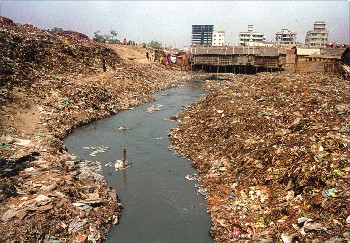 So
what is so great about Waste Concern? Working in partnership with
communities, this organisation has set in motion a process for house-to-house
solid waste collection that is then taken to community-based composting
plants to turn the waste into organic fertiliser. Waste Concern arranges
for fertiliser companies to purchase and nationally market the compost-based
enriched bio-fertilizers it produces, thereby providing jobs for urban
poor that collect the waste and work in the local plants and stimulating
behavioural changes in urban communities and the waste management
industry. In addition, Waste Concern helps to address the environmental
problem of diminishing topsoil fertility due to the use of synthetic
fertilizers and pesticides in Bangladesh. At present, 30,000 people
are benefited from Waste Concern's project in Dhaka. Every year, Waste
Concern produces 500 tons of compost, but the demand from farmers
is rising so much that the fertiliser company marketing it estimates
present demand at 10,000 tons per year. Because of its novel approach,
Waste Concern has received wide media coverage and recognition. Iftekhar
Enayetullah and Maqsood Sinha, Waste Concern's founders, are winners
of Fast Company's first Fast 50 competition, the only ones from Asia.
Delegations from several countries have visited Waste Concern and
started replicating the model in their own cities. Closer to home,
several NGO's have already emulated the model in Bangladesh. UNICEF
and Department of Public Health Engineering have started to do the
same in 14 municipalities throughout the country.
So
what is so great about Waste Concern? Working in partnership with
communities, this organisation has set in motion a process for house-to-house
solid waste collection that is then taken to community-based composting
plants to turn the waste into organic fertiliser. Waste Concern arranges
for fertiliser companies to purchase and nationally market the compost-based
enriched bio-fertilizers it produces, thereby providing jobs for urban
poor that collect the waste and work in the local plants and stimulating
behavioural changes in urban communities and the waste management
industry. In addition, Waste Concern helps to address the environmental
problem of diminishing topsoil fertility due to the use of synthetic
fertilizers and pesticides in Bangladesh. At present, 30,000 people
are benefited from Waste Concern's project in Dhaka. Every year, Waste
Concern produces 500 tons of compost, but the demand from farmers
is rising so much that the fertiliser company marketing it estimates
present demand at 10,000 tons per year. Because of its novel approach,
Waste Concern has received wide media coverage and recognition. Iftekhar
Enayetullah and Maqsood Sinha, Waste Concern's founders, are winners
of Fast Company's first Fast 50 competition, the only ones from Asia.
Delegations from several countries have visited Waste Concern and
started replicating the model in their own cities. Closer to home,
several NGO's have already emulated the model in Bangladesh. UNICEF
and Department of Public Health Engineering have started to do the
same in 14 municipalities throughout the country.
In
the end, all it takes is a little initiative, a little creativity,
and a little concern for one's environment. Let's hope we see more
of it in the future.
For
more information on Waste Concern, visit their website at www.wasteconcern.org
By
Sabrina F Ahmad

